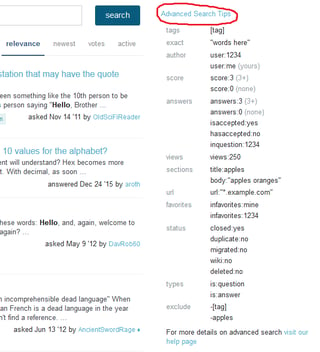First of all, go to the search box in the left-hand side of the topbar:
You can type any word or collection of words into there to get a list of all posts on the SFF site containing all of those words. Putting - before a word will exclude posts containing that word, so e.g. voldemort -dumbledore will give you all posts that mention Voldemort but not Dumbledore. Quotes enable you to search for phrases rather than just collections of words: e.g. "Gandalf the White" will give you all posts containing the phrase "Gandalf the White", not all posts containing those three words somewhere. You can search for URLs linked from within a post by typing url:example.com into the search box.
But probably you know all this already. The interesting bit is how to do more advanced searches. The official page on this is here, but I've rewritten it all below (and wow, did I learn a lot while doing so!) That help page is also linked to from the 'Advanced Search Tips' which you see on the right of every search results page:
Warning: entering a number into the search bar may give you the post with that number as its post ID rather than a list of all posts containing that number in their text. This applies if and only if the post with that ID is a question. For example, searching for 9331 here on meta will take you back to the question above, but searching for 9332 won't take you to this answer. Whether you want to see this as a bug or a feature is up to you; certainly, it has its uses but can also be annoying.
Wildcard
Include * in a search term to do a wildcard search: e.g. Wooki* will give you all questions containing Wooki, Wookie, Wookiee, or any other possible misspelling.
Tags
To search for questions only in a certain tag, include the tag name in square brackets. E.g. white tower [wheel-of-time] will give you all posts in the wheel-of-time tag which mention the White Tower.
To broaden your search to more than one tag, you can use or between tags. E.g. [star-trek-tos] or [star-trek-tng] will give you all posts in either of the two tags star-trek-tos, star-trek-tng. And as with individual words, adding - before a tag excludes posts in that tag, so e.g. [star-trek] -[star-trek-tos] will give you all questions with the star-trek tag but not the star-trek-tos tag.
The wildcard search mentioned above can also be very useful here: searching [star-trek-*] will give you all posts in any of the tags star-trek-tos, star-trek-tng, star-trek-ds9, star-trek-voyager, star-trek-data, and so on (I can't even be bothered to list them all!)
You can search only in tags you have marked as 'favourites' by appending intags:mine to your search terms.
Users
You can search for posts only by a given user provided you know their user ID: e.g. user:976 will give you all posts by DVK. If you're searching for your own posts, you don't have to remember your own user ID: user:me will suffice.
You can also search among a user's 'favourited' questions by adding infavorites:976 or infavorites:mine to your search terms.
Types of post
You can search only questions, or only answers, by including is:question or is:answer in your search.
You can narrow down the range for number of votes, views, and (for a question) answers as follows:
score:-1orscore:-1..will both return posts with a score greater than or equal to -1views:500..1000orviews:500-1000will return posts with between 500 and 1000 viewsanswers:..3(for questions only) will return questions with less than or equal to 3 answers
You can also search only for posts specifying - or not specifying - certain specific criteria. In each of the following cases, you can put 1 or yes or true after the colon to find posts that do satisfy that criterion, and 0 or no or false to find posts that don't.
isaccepted:(for answers only)hascode:hasaccepted:(for questions only)isanswered:(for questions only; only positively-scored answers count)closed:(for questions only)duplicate:(for questions only)migrated:(for questions only)locked:hasnotice:wiki:
Dates
You can narrow down to specific dates or date ranges for posts, using created: to specify when the posts were created and lastactive: to specify when they were last active (created, edited, etc.).
Dates can be entered in the following formats:
Absolute dates, using one, two, or all three of the Y/M/D possibilities.
created:2012..2013searches posts created from January 1, 2012 to December 31, 2013;created:2012searches posts created from January 1, 2012 to December 31, 2012;created:2012-04..2012-05searches posts created between April 1, 2012 and May 31, 2012;lastactive:2012-04-03searches posts which were last active between 12:00 AM on April 3, 2012 and 11:59 PM on April 3, 2012.Relative dates.
1y,1m, and1dare shorthand for "last year", "last month", and "yesterday": e.g., if today is 17 March 2016,created:1msearches posts created between 1 February 2016 and 29 February 2016. (Any other number can be substituted for 1.)
If you want to see all the posts active in the last three months, uselastactive:3m..On 17 March 2016, that will show posts from 17 December 2015 up to the most recently active. You can close the range as well:lastactive:3m..1m.
Of course, all times are in UTC.


